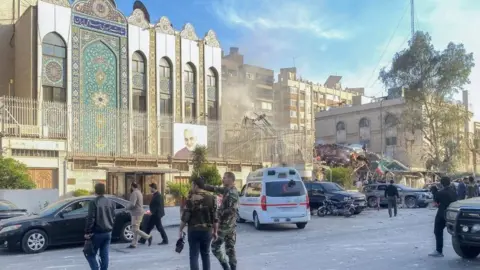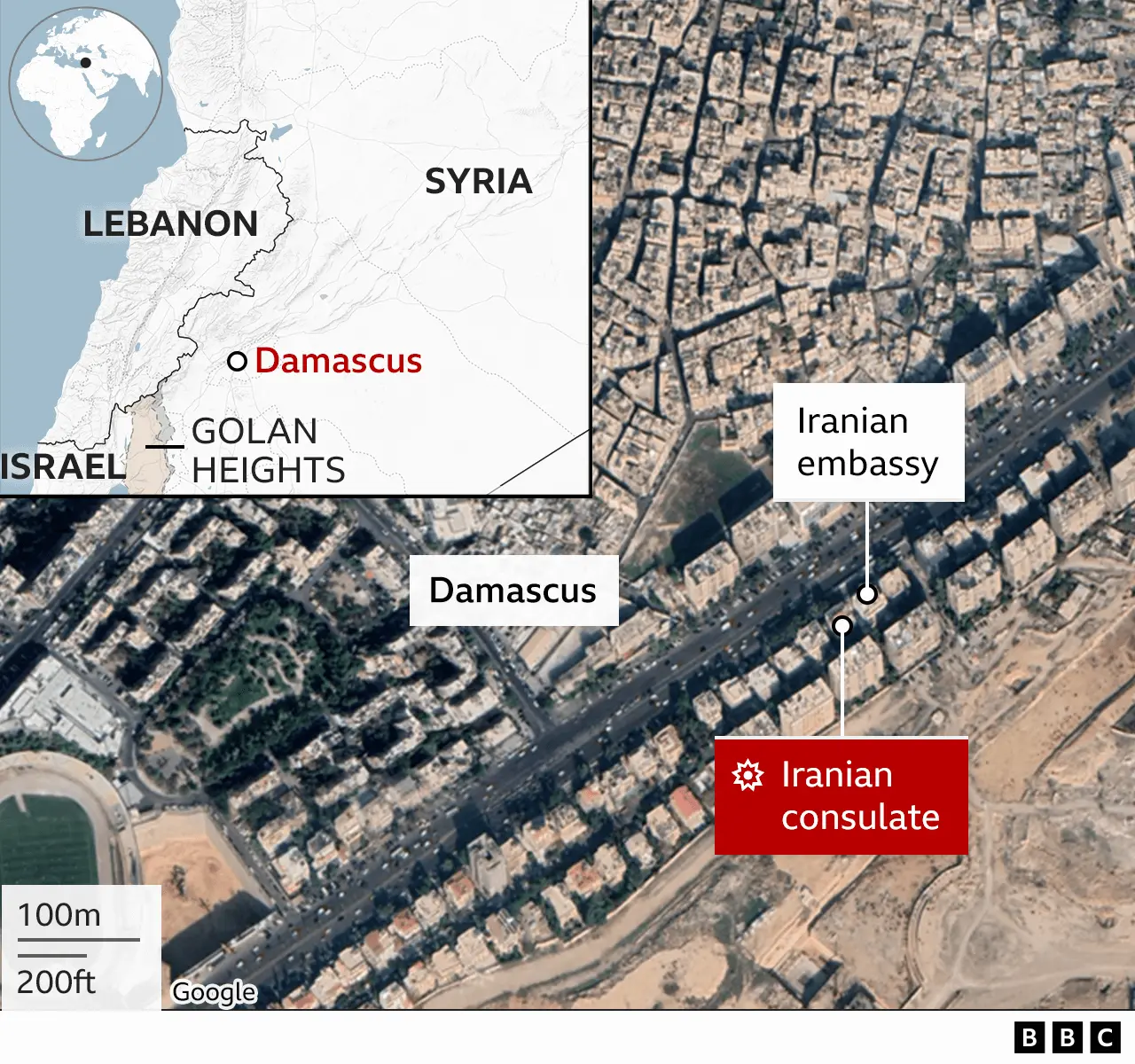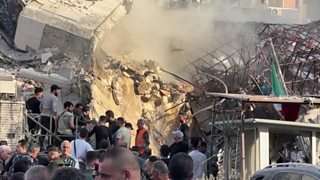Iran’s Revolutionary Guards says seven officers have been killed in an Israeli strike on the Iranian consulate building in Syria’s capital, Damascus.
Brig-Gen Mohammad Reza Zahedi, a senior commander of the elite Quds Force, and Brig-Gen Mohammad Hadi Haji-Rahimi, his deputy, were named among the dead.
Iran and Syria’s governments condemned the attack, which destroyed a building next door to the Iranian embassy.
The Israeli military said it did not comment on foreign media reports.
However, it has acknowledged carrying out hundreds of strikes in recent years on targets in Syria that it says are linked to Iran and allied armed groups which are armed, funded and trained by the Revolutionary Guards.
The Israeli strikes have reportedly been stepped up since the start of the war in Gaza in October last year, in response to cross-border attacks on northern Israel by Hezbollah and other Iran-backed groups in Lebanon and Syria.
But Monday’s attack will be seen as a serious escalation.
The Israelis appear to be testing the resolve of the Iranians and their allies and signalling that they are serious about increasing pressure on their enemies.
The Israelis are looking at the fact that both Iran and Hezbollah have not been pushing as hard as some might expect. Now they will see if Iran and Hezbollah are going to push back.
There will be a response, but it may not be the one people expect. Rather than missiles, it may be some sort of cyber-attack.


Syria’s defence ministry said Israeli aircraft targeted the Iranian consulate building, which was on a highway in the western Mezzeh district of Damascus, from the direction of the occupied Golan Heights at about 17:00 local time (14:00 GMT) on Monday.
Syrian air defences shot down some of the missiles they launched, but others made it through and “destroyed the entire building, killing and injuring everyone inside”, the ministry added.
The ministry said work was under way to recover the bodies and rescue the wounded from beneath the rubble, without saying how many casualties there were or naming any of them.
Photos and videos from the scene showed smoke and dust rising from the remains of the collapsed multi-storey building. The Iranian embassy next door did not appear to have sustained any significant damage.
The Iranian ambassador, Hossein Akbari, said Israeli F-35 fighter jets “brutally targeted my place of residence and the consular section of the embassy, along with Iran’s military attaches”. He told Iranian state TV that between five and seven people were killed, including some diplomats.
Later, the Revolutionary Guards put out a statement saying that seven of its officers were killed, including Brig-Gen Mohammad Reza Zahedi and Brig-Gen Mohammad Hadi Haji-Rahimi, whom it described as commanders and “senior military advisers”.
Iranian media said Zahedi, 63, was a senior figure in the Quds Force – the Revolutionary Guards’ overseas operations arm – and served as commander in Lebanon and Syria between 2008 and 2016. Haji-Rahimi was meanwhile identified as Zahedi’s deputy.
Zahedi is one of the most high-profile Iranian figures believed to have been killed by Israel in the country’s long campaign of targeted assassinations.


The UK-based Syrian Observatory for Human Rights, which relies on a network of sources on the ground in Syria, reported that eight people were killed – a high-ranking leader of the Quds Force, two Iranian advisers and five members of the Revolutionary Guards.
Syria’s Foreign Minister Faisal Mekdad said he strongly condemned what he called “this heinous terrorist attack”, adding that it had killed “a number of innocent people”.
In a telephone conversation with Mr Mekdad, Iranian Foreign Minister Hossein Amir-Abdollahian described the strike as “a violation of all international obligations and conventions” and “blamed the consequences of this action on the Zionist regime”, the Iranian foreign ministry said.
He also “stressed the need for a serious response by the international community”.
A White House spokeswoman said US President Joe Biden was aware of the reports.
In a briefing to journalists on Monday, IDF spokesperson Rear Adm Daniel Hagari said an apparent drone attack on a naval base in the southern Israeli city of Eilat was “a very serious incident”. The drone was “made and directed by Iran”, he said.
This attack followed suspected Israeli strikes on Damascus and the northern city of Aleppo last Friday, which the Syrian Observatory for Human Rights said killed 53 people, including 38 Syrian soldiers and seven members of the Iran-backed Lebanese armed group Hezbollah.
In January, another strike in Mezzeh that was blamed on Israel killed five senior Revolutionary Guards and several Syrian security personnel.
Israel has previously acknowledged carrying out strikes in Syria to combat what it calls Iran’s “military entrenchment”, as well as shipments of Iranian weapons to allied groups which it proscribes as terrorist organisations.
Iran has said Revolutionary Guards have been sent to Syria to “advise” President Bashar al-Assad’s forces in the country’s civil war, but it has denied they have been involved in combat or established bases.











































